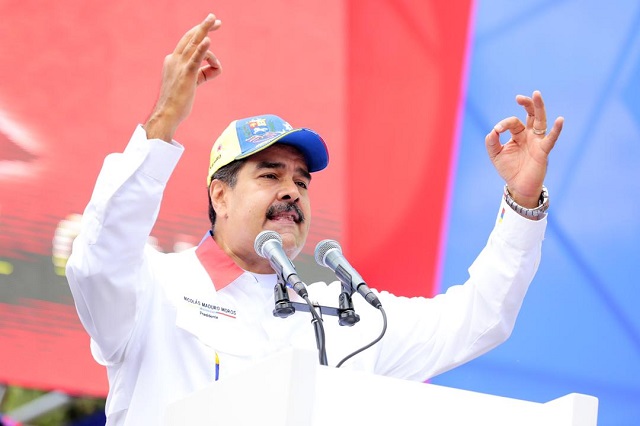
Caracas, Venezuela | AFP | Venezuelan President Nicolas Maduro is being squeezed internationally as the United States pressures key multilateral bodies to boot out his “illegitimate” representatives.
To publicly underline America’s position and its support of Venezuelan opposition leader Juan Guaido as interim leader, US President Donald Trump on Wednesday welcomed Guaido’s wife, Fabiana Rosales de Guaido, to the White House.
Trump boasted Maduro and his regime “have got plenty of pressure right now,” adding: “Other than military you can’t get any more pressure than they have.”
But at home Maduro has dug in, determined to stay in charge of his now impoverished oil-producing country of 30 million people.
The beleaguered socialist leader has been boosted by overt support from main ally Russia, which last weekend deployed 100 troops and military equipment Venezuela. Moscow says it is working to prevent a US-backed “coup.”
China, too, is sticking by Maduro, challenging the US diplomatic push.
The moves have escalated the crisis in Venezuela into a geopolitical one.
– ‘Illegitimate regime’ –
After Guaido declared January 23 he was constitutionally the interim president on the argument that fraudulent elections last year left Maduro illegitimate, the United States and its allies in Latin America and Europe endorsed him.
Since then, the US has rejected Maduro’s envoys in international forums.
This week, Maduro’s representative was replaced by Guaido’s pick in the Paris-based International Chamber of Commerce, according to Paraguay, which had turned to that body’s arbitration section to adjudicate a $300-million case involving Venezuelan state oil company PDVSA.
A switch also took place in the Inter-American Development Bank (IDB), where the US holds 30 percent of voting power.
The Washington-based bank was supposed to hold its annual meeting in China this week, but that was scrapped after Beijing refused to grant a visa to Guaido’s representative.
A Chinese foreign ministry spokesman complained that “sensitive political issues” had overshadowed IDB talks on financial cooperation.
More importantly, the World Trade Organization on Tuesday was forced to suspend its regular dispute settlement body (DSB) as the Maduro-appointed delegation was trying to get the WTO to rule against US sanctions.
“Because the Maduro regime is not the legitimate government of Venezuela, Maduro’s representatives are not the legitimate representatives of a WTO Member. Therefore, neither the agenda item nor the panel request would legitimately be before the DSB,” a US official said in a statement.
“The US position toward the representatives of the illegitimate Maduro regime at the WTO reflect and reinforce the foreign policy of the United States … to recognize Juan Guaido as the interim president of Venezuela,” the official said.
The unusual occurrence means WTO dispute settlement procedures could potentially be blocked, closing off a crucial arbitration avenue for other countries with trade disagreements.
Further Venezuela-related friction on other international bodies could yet emerge.
Last month, at the UN Disarmament Conference in Geneva, the US ambassador objected to Maduro’s representative being present, saying: “The Maduro regime is illegitimate, having stolen an election from the Venezuelan people.”
And US-aligned South American countries last week launched a new regional bloc, the Forum for the Progress of South America (Prosur), to replace UNASUR, a largely defunct organization co-created in 2008 by late Venezuelan leader Hugo Chavez.
Also, the United States and its allies are in the process of handing over Venezuela’s diplomatic missions on their soil to Guaido’s envoys.
– ‘Russia has to get out’ –
But with Russia and China both holding permanent UN Security Council seats and influential roles in other forums, it was unclear how far Washington’s campaign against Maduro’s representatives can go.
The US has run up against the limits of its diplomatic muscle several times, most notably in attempts to persuade other countries to adopt policies seen favoring Israel over the Palestinians. Trump has also adopted an “America First” stance with less regard for multilateral institutions.
While Maduro has certainly become more internationally isolated, he can still count on backing not just from Russia and China but also from Iran, Nicaragua, Cuba, Bolivia and Turkey.
But it was Moscow’s support for Maduro that caught Trump’s ire on Wednesday.
“Russia has to get out,” he said, alongside Guaido’s wife.
Vice President Mike Pence, who was also at the meeting in the White House, said Maduro “is a dictator with no legitimate claim to power.”
He added: “We call on Russia today to cease all support of the Maduro regime and stand with Juan Guaido, stand with nations across this hemisphere and across the world until freedom is restored.”
 The Independent Uganda: You get the Truth we Pay the Price
The Independent Uganda: You get the Truth we Pay the Price



